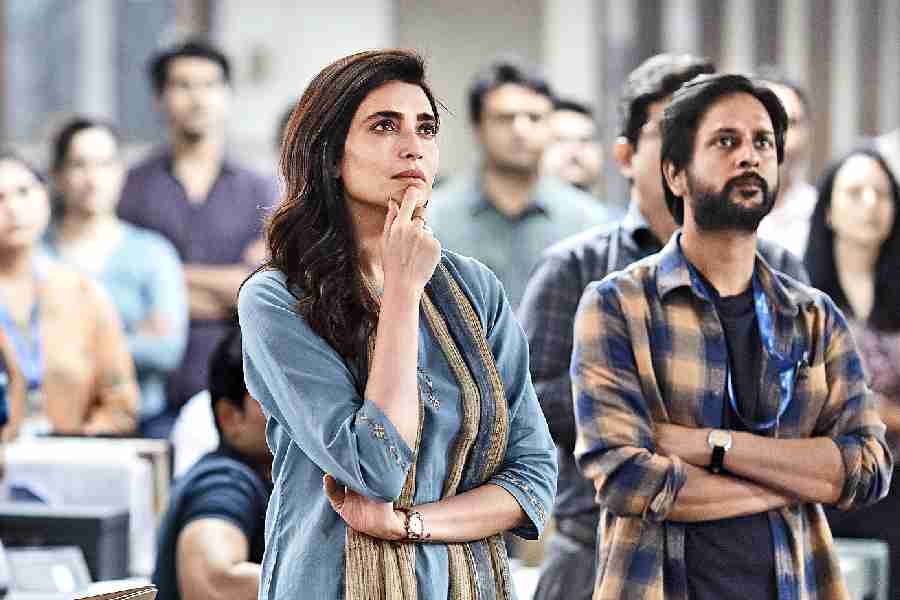At some point in Scoop, a key character, when asked to sacrifice the truth inherent in his brand of journalism at the altar of pleasing the powers-that-be, cites Jonathan Foster: “If someone says it’s raining and another person says it’s dry, it’s not your job to quote them both. Your job is to look out of the f*****g window and find out which is true.”
It is true that this observation from Foster is oft-quoted. It is also true that these words are now more relevant — or rather, irrelevant — to a lot of what passes off as journalism in India today. Scoop is based on a real-life incident of crime and misdemeanour, one that shook the pillars of the fourth estate in the country a little more than a decade ago. But more than that, it is a reminder, if not a commentary, on what journalism is, and what it ought to be.
The six-part series, now streaming on Netflix, comes from Hansal Mehta. Over the years, Mehta — Shahid to Aligarh, Scam 1992 to Faraaz — has built a reputation for adapting life on screen, without sugar-coating the bitter truths of the stories that he tells. That holds true even for Scoop — a well-researched, compellingly written, efficiently acted series — in the treatment of which Mehta doesn’t forget two things that a large part of journalism has lost today: being sensitive and sensible.
Working out of a script penned by Mrunmayee Lagoo Waikul, Scoop partly derives its source material from Jigna Vora’s book Behind Bars in Byculla: My Days in Prison. Vora, an intrepid crime reporter, found herself in the middle of an unexpected, almost unbelievable, storm when she was accused of colluding with the underworld in the daylight murder of fellow journalist Jyotirmoy Dey. The year was 2011, and Vora spent almost nine months in jail and seven years after that to clear her name. She’s no longer an accused in the eyes of the law, but as Vora herself says at the end of Scoop, the scars will always remain.
It is these scars — not only on an individual but on a system manipulated and mangled beyond recognition — that Scoop brings to the forefront. The journalist, forever relegated to the sidelines, holding a mic and jostling for a byte on screens big and small, is made the hero here. Or rather, the heroine.
Jigna Vora becomes Jagruti Pathak in Scoop, a highly ambitious crime reporter whose nose for news and ability to spot a Page One story, has made her rise through the ranks quickly. Jagruti — played by Karishma Tanna with the kind of tenacity and vulnerability that easily makes it her career-best performance — is someone who will not let anything come in the way of her seeking out a news piece.
Ambition in women, even today, is often a bad word, and Jagruti’s daily hustle, which Scoop presents matter-of-factly and doesn’t overdramatise, doesn’t go down well with most of her peers. Her “healthy competition” with fellow crime reporter Jaideb Sen (Prosenjit Chatterjee in a short but impactful role) is the subject of gossip at the local press club. Those were the days when the underworld-cop nexus was at its peak, and when Sen is gunned down, Jagruti finds herself a scapegoat, framed as an accessory to the murder, even as the murky mesh of lies and dirty politics transforms her from the one writing the news to becoming the news herself.
Even though Scoop veers dangerously close to appropriating every cliche associated with journalism in the book — professional rivalry, journalistic ethics, the job of telling the truth and how that’s compromised in the pursuit of grabbing eyeballs — Mehta’s non-dramatic treatment reigns in the narrative at crucial junctures. The show works in a slow-burn fashion, with the cobweb of deceit around Jagruti — a single mother living in a cramped apartment with her boisterous Gujarati family — building gradually. The final two episodes, which present the vagaries of life in prison and have been largely derived from Vora’s book, sensitively look at the helplessness of a woman whose ambition and desire to tell the truth got in the way of her freedom, and eventually, her life.
Over six taut episodes, Scoop expertly holds one’s attention, which is a tall ask given that one knows the beats of the story and how exactly it will end. Mehta’s direction and Waikul’s script are given strong support by an as-good-as-it-gets cast, with Mohd Zeeshan Ayyub — playing Jagruti’s boss and unflinching supporter — delivering an act which is understated and yet powerful. Harman Baweja makes you sit up and take notice, while Tanmay Dhanania’s character succinctly embodies the kind of journalist that starts off with fire and lets it fizzle out in the race to the top.
Whether you follow the daily news cycle or choose not to, Scoop is a series that will make you ponder. Especially the line: “Pehle hota tha, if journalism is good, by default it will be controversial. Ab ulta hain. If it’s controversial, by default it’s good journalism.” Truer words were never spoken.











